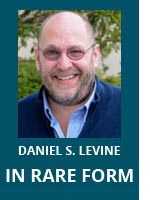Exploring the Costs of a Once Common Fate for People with Rare Neurodevelopmental Conditions
August 8, 2023

Jennifer Senior was 12 when she first learned she had an aunt, Adele, and then she forgot about her for many years.
A doctor had told Adele’s mother in 1952 that her daughter was a “microcephalic idiot,” a term that amounted to a diagnosis then. On the advice of their doctors, her parents placed Adele, then 21 months old, in New York’s Willowbrook State School. Willowbrook would later be exposed as a notorious place of institutional neglect and suffering—what Senior would describe as a “gothic mansion or horrors.”
In the September issue of The Atlantic, Senior recounts the story of her aunt Adele and the way people of her aunt’s generation, who like her were born with neurodevelopmental disorders, were commonly institutionalized. “It is astonishing,” writes Senior, “how many Americans have relations who were, at some point during the past century, sequestered from public view. They were warehoused, disappeared, roughly shorn from the family tree.”
Senior’s mother went 40 years without seeing her sister. When her parents sent Adele away, they told Senior’s mother that she was going to “walking school.” For years she would ask when her sister would come home. She would later describe the feeling of her sister’s departure as feeling like she lost an arm. When she saw her all those years later, she felt as if she had been deprived of having “a real sibling.”
It was in 1998, when Adele was 70, that Senior went with her mother to meet her aunt for the first time. Adele spoke little. Adele’s parents had been told she would never walk, talk, or use a toilet on her own.
But when she recounts a visit in 2022 to upstate New York to the group home where Adele had been living for more than 20 years at that point with a caregiver, Senior’s mother is struck by how different Adele is. She had been made to believe that Adele would never improve. Now, though, she was talking more. She had learned to use a toilet. She even walked and danced.
Senior had asked if Adele had ever received a diagnosis and whether anyone ever performed a genetic test. When the family finally did this at the end of 2022. Adele was diagnosed as having Coffin-Siris syndrome, a condition first identified in 2020. At the time there were just 12 known people with the condition, but today there are between 30 and 50.
Senior joined a Facebook group and connected with a family with a 7-year-old girl Emma who has the same sub-type of the syndrome as her aunt. The family adopted Emma when she was 7 months old, aware of her condition. They have had access to state resources, what Senior characterized as a “sophisticated” public school, multiple support groups, and “the benefit of a culture that’s come a long way toward appreciating neurodiversity.”
In some ways, Emma reflects an alternative universe, the life Adele could have had if only she had been born at a different time. She had no shortage of developmental problems, but received hours of occupational, physical, and speech each week since she was an infant. She also had the benefit of caring and involved parents. When Senior met her, she could only count to 12. Four months later she was adding and subtracting.
Coffin-Siris syndrome is highly variable, but a clinical geneticist told Senior that had Adele had the treatments available today, her life would likely have been very different. “She may not have been as high functioning as Emma,” the geneticist said, “but she could have maximized her potential, and her quality of life would’ve been a lot better.”
Senior doesn’t write with bitterness or judgement about her grandparents’ decision to institutionalize their daughter. She doesn’t think they were “capitulating to social pressure.” Instead, she said they were “simply listening to the advice of their doctors, authoritative men with white coats and granite faces who told them there was no point in keeping their daughter at home.”
It’s a disturbing and painful story to read—a reminder of how ignorance and cruelty pair so well. But it’s also a reminder of how much is lost when a society casts away people who are neurologically atypical.
Senior refers to the work of Jennifer Natalya Fink, a Georgetown disability-studies scholar who writes about what happens when disabled people are not given their proper place in their families.
“With time, we would learn the terrible toll that institutionalization took on those individuals. But they weren’t the only ones who paid a price, Fink argues. So did their parents, their siblings, future generations,” writes Senior. “’In hiding our disabled relations,’ she writes in her book All Our Families, ‘we as a culture came to view disability ‘as an individual trauma to a singular family, rather than a common, collective, and normal experience of all families.’”

Stay Connected
Sign up for updates straight to your inbox.
